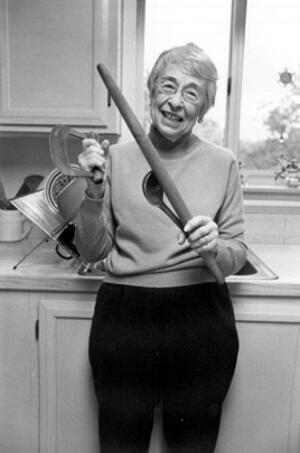Alice Siegal
A social reformer and political activist, Alice Siegal is a tireless advocate for families and disadvantaged youth and a fierce opponent of discrimination wherever she encounters it. Born and raised in Seattle, Alice grew up within the Orthodox, Ashkenazic community. Alice's maternal grandmother and mother were both involved in the Workmen's Circle, and this had a profound impact on her life in terms of social action. In 1942, Alice married her husband, Art Siegal. After her two children were born, Alice attended the University of Washington and received a Bachelor of Arts Degree in Sociology, a teaching certificate, and a Master's Degree in Counseling. Upon graduation, Alice worked for the Washington State Employment Service War on Poverty Office, the Youth Opportunity Center in the 1960s, and the Seattle Public Schools Disadvantaged Youth Program in the 1960s and 1970s. In the 1970s, Alice began counseling students for the Bellevue Public Schools. More recently, Alice has worked as a counselor for Jewish Family Service. Volunteer work plays an essential role in Alice's life as well. She is a dedicated member of the Adult Education and Social Action Committees at her synagogue, Temple De Hirsch Sinai.
Alice recounts her family's history, childhood in Seattle, and the neighborhood where she grew up. Alice looks back on how Seattle's Jewish community and neighborhoods have changed. Alice's family ran a clothing and tailor ship, United Tailors, where she worked as a teenager. Growing up, Alice's role models were her father and her grandmother. Her father taught himself English, served in the First World War, and became a pacifist after his service. Alice's grandmother was a kind woman who helped others and was involved in the Workmen's Circle (now The Workers Circle), a nonprofit that promoted social equality and served Jewish communities. Alice talks about her immediate family, siblings, and parents' expectations regarding marriage and education. She recalls her educational experience growing up, dealing with a problematic first-grade teacher, and advocating for herself in school. Alice traces the roots of her passion and life-long career in social justice to incidences of injustice she witnessed and experienced as a young woman. In 1941, Alice started taking classes at the University of Washington but dropped out to support her future husband, Art Siegel, who was a student at the time. Siegal recalls outrage at hearing about Japanese internment camps during World War II. She recounts the early year of marriage, the events of World War II, and the death of her father in 1945. After her father's death, Alice fell into a depression, sought help, joined the Group Health Cooperative, and eventually went back to school part-time in the 1960s, earning a degree in sociology and her teaching certificate. Seigel was able to earn her master's degree through the state as a state employee. She discusses the way Judaism ties in with her social justice background. Finally, Alice reflects on raising her family, developing her career as a teacher and counselor, and her community work, volunteering for social causes. Other topics include Zionism, Jewish Family Service, gender roles, Orthodox Judaism, the Holocaust, and tzedakah.



